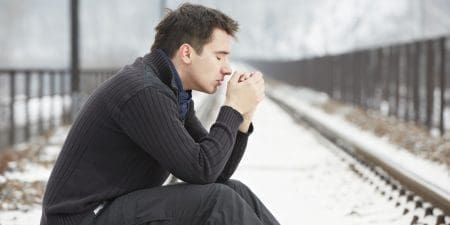Behavioral health is more discussed than ever, and depression has been at the forefront of this conversation. And that has been a great help for many people seeking treatment for depression. However, this conversation often focuses solely on milder depression treatments like therapy or antidepressants. For many people living with depression, though, they need more intensive types of treatment. In short, they need inpatient depression treatment.
But how do you know if you need inpatient depression treatment or just counseling? Struggles with depression are unique to the individual, so it can be hard to say for sure what you might need. But there are many mental illness signs and symptoms that can indicate which types of treatment you would most benefit from. And the process of figuring out the right depression treatment for you begins with learning more about this mental health condition.
Common Types of Depression

What Are the Symptoms of Depression?
If you or someone you love struggles with depression, then it’s important to know that depression can look very different on different people. This is partially because there are various types of depression, each with their own symptoms and issues. To start, let’s take a quick overview of the most common types of depression, according to the National Institute of Mental Health.
Major Depressive Disorder
This type of depression is the most commonly discussed, and it’s what most people think of when they talk about depression. This mood disorder presents with the most well-known symptoms of depression, including:
- Lack of energy
- Near-constant feelings of tiredness
- Loss of interest in previously enjoyable activities
- Feelings of despair or hopelessness
- Thoughts of self-harm or suicide
Unlike normal feelings of sadness, major depressive disorder isn’t something that an individual can just “get over.” It’s persistent, overwhelming, and it can make it hard to believe that there is a light at the end of the tunnel. This form of depression can sometimes be triggered by distressing life events like the loss of a loved one, but if these feelings persist or start to interfere with daily life, then you may not just be depressed, but you may have a true depressive disorder. And in that case, you may need inpatient depression treatment options.
Psychotic Depression
Like major depressive disorder, psychotic depression often comes with symptoms like intense sadness and a lack of energy. However, what characterizes psychotic depression is the accompanying belief in unshakeable, false beliefs, like hearing things that nobody else does or believing that everyone around you secretly hates you.
In many cases, these hallucinations and delusions will follow a similar theme. For example, someone with psychotic depression might consistently hear people whispering about how an accident was their fault, causing them to feel guilty and depressed. Psychotic depression is often severe, with the individual unable to determine what is and isn’t real, which often requires inpatient depression treatment.
Bipolar Disorder
Previously called manic-depressive disorder, bipolar disorder is known for its extreme highs and lows. Like other forms of depression, people with bipolar disorder experience periods where they feel sad, isolated, etc. But unlike other forms of depression, bipolar disorder also comes with manic states, where an individual feels ecstatic and seems to have boundless energy.
But just like there are different types of depression, there are also different types of bipolar disorder. Some people with bipolar disorder experience depressive states like usual, but instead of mania they have hypomanic states, which are similar but less intense. There is also a common misconception that bipolar disorder is preferable to depression because it comes with emotional highs. But the truth is that manic states can be just as dangerous, leading people to engage in reckless behaviors.
Do I Need Inpatient Depression Treatment?

Now that we’ve covered some of the most common types of depression, it’s time to see if a residential treatment center for depression is right for you. There are a couple areas to consider when deciding if you need inpatient support to treat depression.
First, consider how long these feelings have been affecting you. Has it been a week? Two? Or has it been longer, lasting for a period of months or even years? If these feelings are relatively recent, then they could be normal feelings resulting from difficult or stressful times. However, if these feelings persist for upwards of six weeks, then you may need inpatient depression treatment to address a more serious, prolonged issue.
But length of time isn’t the only area that matters when deciding if inpatient depression treatment is for you. You should also reflect and take into account how your depression symptoms have affected your life.
For example, milder depression might only mean feeling down and not being as talkative. In general, outpatient therapy may be enough to support you and get you back on track.
But for more severe cases, inpatient depression treatment may be necessary. This is especially true if you’re having trouble at work or school, you feel like you can’t enjoy life anymore, or if you have a plan to harm yourself. Thoughts of suicide is a normal symptom of depression and is not alarming by itself, but when you start to develop a plan, that’s a surefire sign that you can benefit from inpatient depression treatment.
Now that we know some guiding principles on determining the right treatment for depression, let’s take a look at what you can expect from inpatient depression treatment in Naples, Florida.
Inpatient Behavioral Health Treatments
When it comes to inpatient depression treatments, there are two primary programs that most people choose. Neither of these programs is “better” than the other, but depending on your specific needs, one may be a better fit for you.
Adult Mental Health Program
Within this inpatient depression treatment program, you will work with mental health experts to regain control over your depression symptoms. For chronic depression, there may never be a cure. But that doesn’t mean that the situation is hopeless. Through a combination of medication support and coping skills, you can learn to control and manage your symptoms through our adult psychiatric services. And at The Willough at Naples, our evidence-based therapies are specially designed to help you do exactly that.
While every patient receives an individualized treatment program, some of our depression treatment options include:
- Mental health assessments
- Crisis evaluation and support
- Family therapy sessions
- Group therapy
- Voluntary medication management
- Discharge planning
The goal of this inpatient depression treatment program is to use evidence-based therapeutic techniques to empower you to regain control over your depression. Enrolling in inpatient treatment can be scary, but an adult mental health program is nothing to be afraid of. In fact, if you’re living with severe depression, it could even save your life.
Dual Diagnosis Treatment
In many cases, depresion does not occur by itself. Instead, it develops alongside a substance abuse problem. In this case, mental health professionals would call the substance use disorder and depression co-occurring disorders, meaning they developed together and reinforce each other. And the only way to comprehensively treat co-occurring disorders is through a type of inpatient depression treatment called a dual diagnosis program.
During dual diagnosis care, you will work with mental health experts and addiction specialists to address both addiction and its root causes in depression. In this way, not only do you receive mental health support, but you greatly lower your risk of relapse. Unlike other Florida rehab programs, dual diagnosis treats all aspects of addiction, which means better treatment outcomes for you. If you’re considering inpatient depression treatment and want support for substance abuse as well, this program is a perfect match.
Inpatient Depression Treatment Starts Here
If you’ve decided that inpatient depression treatment is right for you, then we’re ready and willing to help. With a variety of depression treatment options available, we want to work with you to help you regain control over your life and your mental health.
Are you ready to start the admissions process, or do you have more questions? Call our friendly admissions specialists at 1-800-722-0100 or submit your questions online through our confidential contact form. Inpatient depression treatment can change your life if you’re willing to reach out and accept professional help.

